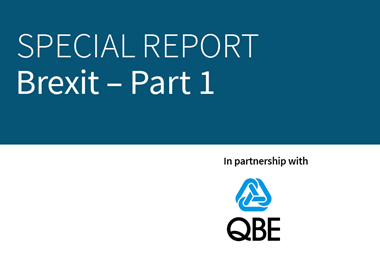Two-thirds of risk professionals questioned say a Brexit would not affect them, while 25% warn of serious disruption

It’s looking as though later this year, the British public will vote on whether to remain in the European Union. The UK joined the EU – back when it was the European Economic Community, or EEC – in 1973, and its relationship with its neighbours has long been ambivalent. During the last referendum on membership, in 1975, 67% voted to stay in. This time around, though, with various polls showing opinion split fairly evenly, some risk managers are concerned about the chances of Britain leaving.
That said, a recent poll of StrategicRISK readers shows that this sentiment is not shared by the entire risk community. Two-thirds of risk managers responding to the poll say they do not believe their companies would be affected at all if the UK were to leave the EU. Only 25% think they’d be severely affected by a British exit (‘Brexit’) and 8% say they’d be barely affected.
Summer referendum
Though the UK government has promised to hold a referendum by the end of 2017, the actual date has yet to be announced. Many observers in the media and politics have earmarked 23 June 2016.
Much will depend on the UK’s ability to secure changes to its membership of the EU. The prime minister, David Cameron, has been very publicly engaged in the ongoing negotiations.
Gilbert Canaméras, secretary general of FERMA and consultant at Eramet, the French multinational mining and metallurgical group, calls Brexit the main political risk in Europe.
“At macroeconomic level, it is an important issue because it would create new regulations between the UK and the rest of Europe,” he says. “London could lose its status of financial capital and suffer new taxes for products imported from European countries.”
For European businesses, a Brexit would create uncertainties around doing business with the UK due to the change in regulations, currency volatility and import controls, he adds.
Given the potentially far-reaching consequences, Canaméras believes companies are not really prepared for a Brexit. “The possibility of a Brexit is estimated at 33% in the financial markets. In that case, we can just wait and see.
“But if the percentage increases, it may for instance be necessary to do some currency hedging and to strengthen credit risk policies.”
Scottish independence
Short to medium-term instability and uncertainty on the currency and stock markets is also a concern for Colin Campbell, head of risk and compliance at retailers Arcadia Group. He says a Brexit could lead to a plethora of downsides for the UK, from financial institutions and manufacturing businesses relocating their head office or major operations, to labour shortages and calls for another referendum on Scottish independence (if Scotland seeks to stay in the EU and secede from the UK).
Additionally, the removal of EU subsidies may have adverse effects on some regions in the UK, possibly making Britain even more London/south east-centric.
Some industries would be affected as well. “Farming subsidies from the EU will no longer be available to UK farmers, which may mean many will have to give up the profession. It would certainly require a reworking of their business models,” Campbell says.
UK farmers would suffer less from cheap imports from the rest of the EU, which sometimes lead to oversupply. The worry is that if supply from the EU declined, food prices in the UK could increase.
On a more positive note, Campbell believes that generally, most UK businesses would welcome a reduction in new regulations.
The insurance sector
But while some sectors may benefit from this, the insurance industry is unlikely to be one of them. In a recent speech to the Insurance Institute of London, Lloyd’s chief risk officer Sean McGovern said Brexit does not offer a route to “insurance regulatory nirvana”, as the UK regulatory system has been largely driven by domestic political and regulatory concerns and cannot be blamed on Brussels.
An equivalence finding under Solvency II does not provide a solution either, he added. “The UK would, under EU parlance, be a ‘third country’, and whilst it may be found to have a regulatory regime that is equivalent to Solvency II, that does not confer a right to access the EU market, either on a cross-border or on a branch basis.”
McGovern made it very clear that the UK’s membership of the EU is key to Lloyd’s future growth and its competitive position as part of the global insurance market.
While he stressed that the best scenario would be for the UK to remain in the EU, McGovern said Lloyd’s has been working on contingency plans to deal with a range of possible scenarios.
“In the event of a vote to leave, we would work with the UK government and EU institutions during any negotiations to retain market access for Lloyd’s and the London market and create as much regulatory certainty as possible,” he said.
McGovern added that Lloyd’s has examined all alternatives to the UK’s existing relationship with the EU if Britain votes to leave. “There is real uncertainty about what those alternatives might be and what will be politically and practically achievable after a vote to leave. What we do know with certainty, however, is that none of the alternatives will be as beneficial for the London market as the current relationship.”




















No comments yet